When University Editor-at-Large Maria Henson (’82) suggested that I join in Pro Humanitate Days with my daughter and share our experiences, I was all in. I have returned to Wake Forest, and my hometown of Winston-Salem, after living in Charlotte, Atlanta and New York City in the past 30 years, and it’s a pleasure to take part in traditions that have started in that intervening lifetime.
So, I sat down with John Champlin (’06, MBA ’15), director of Alumni Engagement, to better understand how Pro Humanitate Days came to be and to get his advice on where to volunteer.
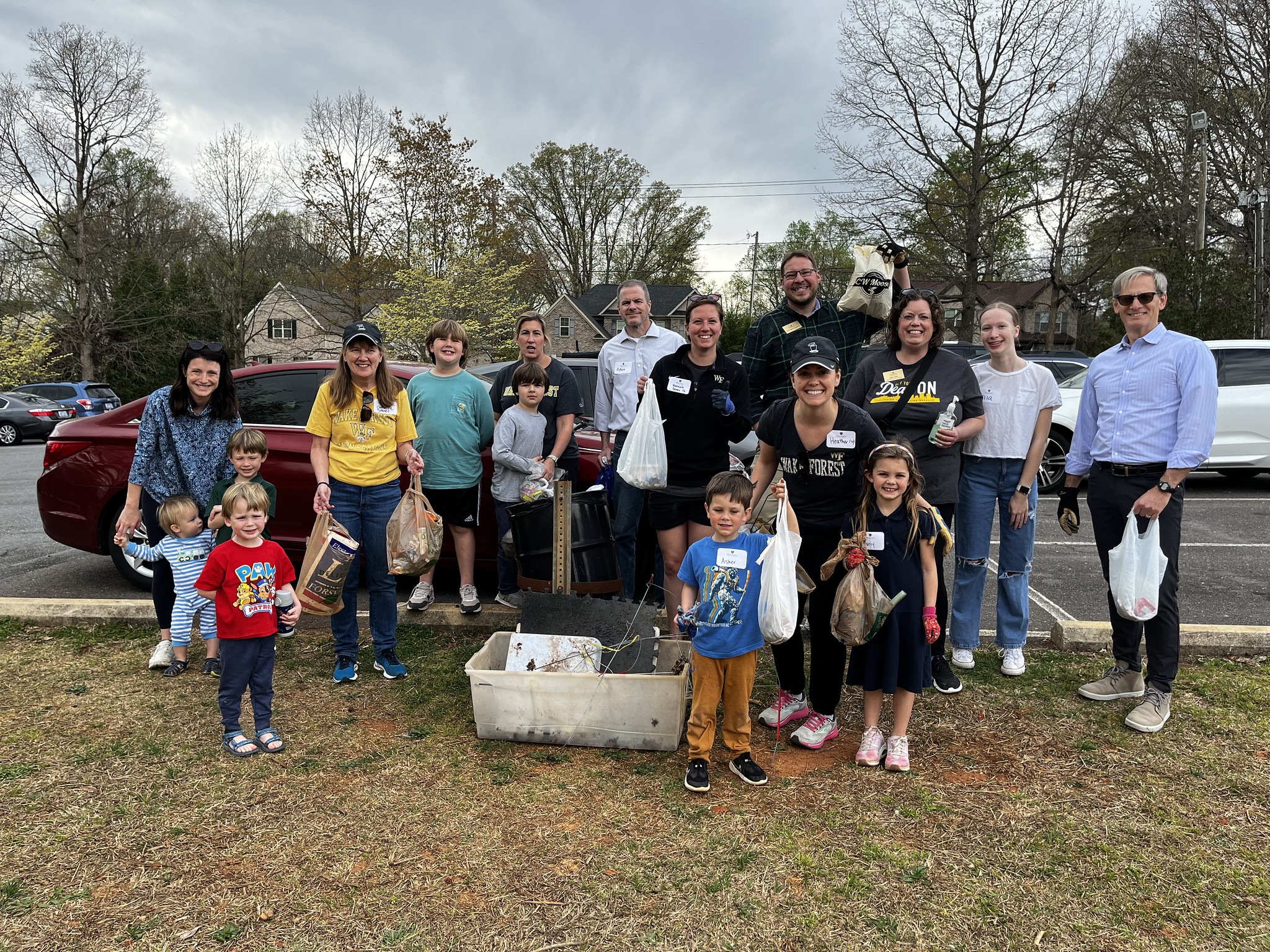
Winston-Salem park clean-up in 2023, with John Champlin (’06, MBA ’15), director of Alumni Engagement (the tallest person on the back row)<br /> Photos courtesy of Wake Forest University
The spark for their creation was pretty simple: All of you. The idea of a dedicated day of service by Wake Forest alumni, families, faculty, staff, students and friends around the country, now stretching across eight days, came about in response to alumni regularly checking in after natural disasters, often hurricanes, to see if the Alumni Engagement team was organizing a way for us to collectively help. In 2006, the team decided to get more proactive about Pro Humanitate and launched the first day of service in 2007. Many of the community partners have stayed constant throughout the years, with new ones added, often through deep relationships with alumni already involved on boards or as employees.
Seventeen years later, 250 to 300 of us alumni now typically participate in about 50 projects around the country. Some alumni turn into longtime volunteers or board members following their introduction through our days of service. John, for example, volunteered at Second Harvest Food Bank of Northwest North Carolina for Pro Humanitate Days and during the COVID-19 pandemic went back again and again, working 40 hours in all.

Wake Forest alumni help serve dinner at SECU Family House in Winston-Salem.
I originally had planned to help provide dinner April 11 at the SECU Family House. Opened in 2011, it’s sort of like the Ronald McDonald House for families of adult patients, providing lodging and support for those traveling with loved ones to Forsyth County for medical treatment. My daughter and I signed up to bring big salads and help serve the meal. Tragically, a death in my family stopped us from going; the alumna organizing us, Heather Bolt Mikeal (’10), who sits on SECU Family House’s board and is past chair, was completely gracious and understanding.
I had also signed up to help other alumni and staff to do prep work that morning for DESK, which stands for Developing Education through Student Knowledge. I still got to help with this project, because the threat of thunderstorms pushed it to April 16.
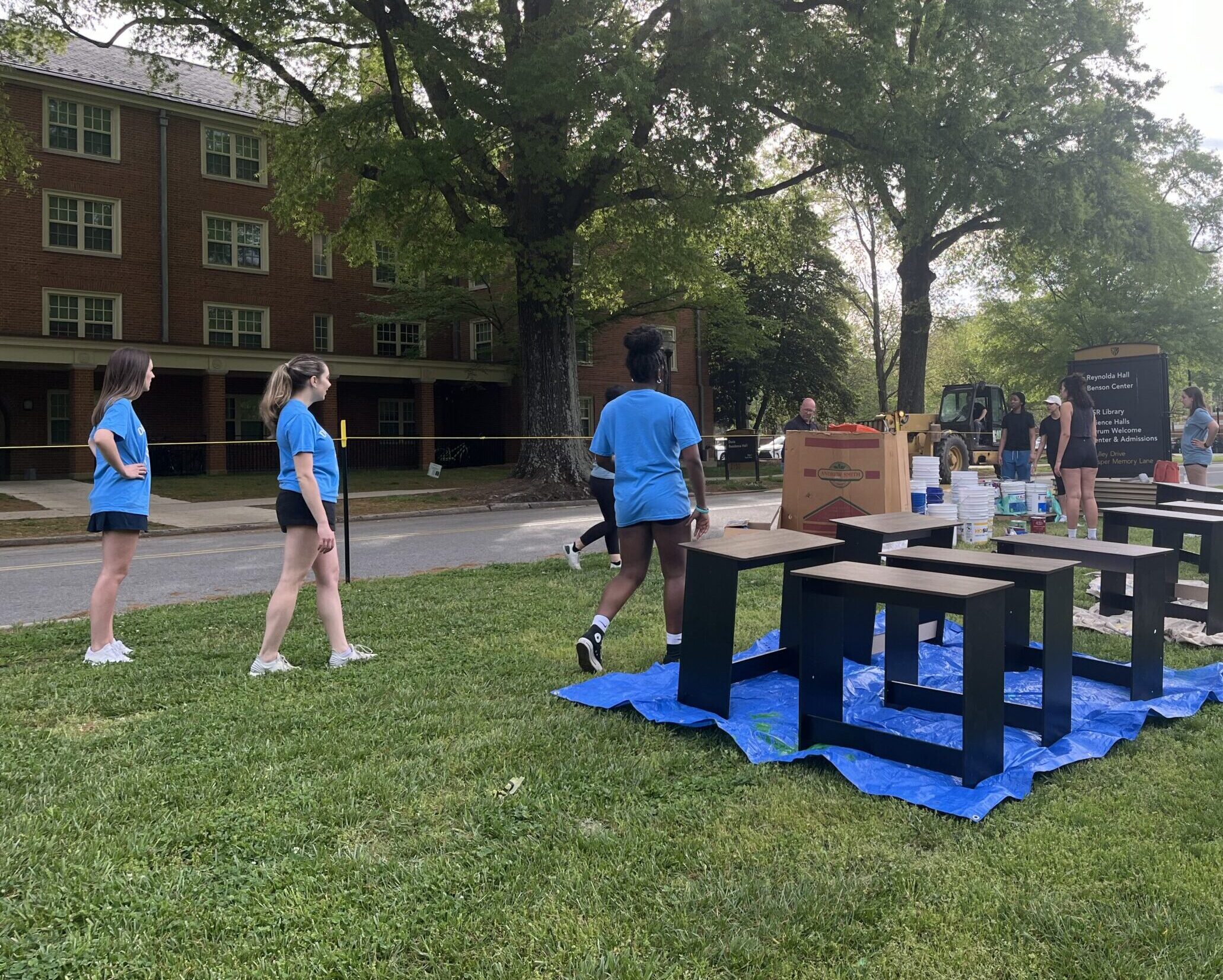
The morning crew of alumni, staff and students sets up for DESK, a project through which local children get to paint a study space they can call their own.
I painted alongside Kristen (Franke) Johnson (’00), a lovely alumna who recently moved back to Winston-Salem to be closer to her parents and teach sixth-grade English language arts at an economically challenged middle school. Together, we lamented the lack of instruction in grammar these days and joked about the ways we indoctrinate our daughters anyway.
When 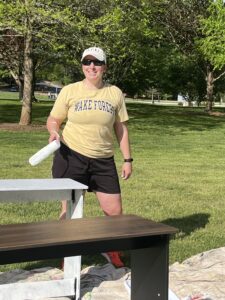 I learned that Kristen (left) had moved back after a health scare in her own family, I shared with her what had happened in my family the week before — we had finally lost my 93-year-old father after a months-long battle with pneumonia. I miss him terribly, but I wouldn’t have wanted him to have to struggle any longer. And my dad, seriously, loved to paint. He would have been pleased to know I was contributing (in a very small way) to this project.
I learned that Kristen (left) had moved back after a health scare in her own family, I shared with her what had happened in my family the week before — we had finally lost my 93-year-old father after a months-long battle with pneumonia. I miss him terribly, but I wouldn’t have wanted him to have to struggle any longer. And my dad, seriously, loved to paint. He would have been pleased to know I was contributing (in a very small way) to this project.
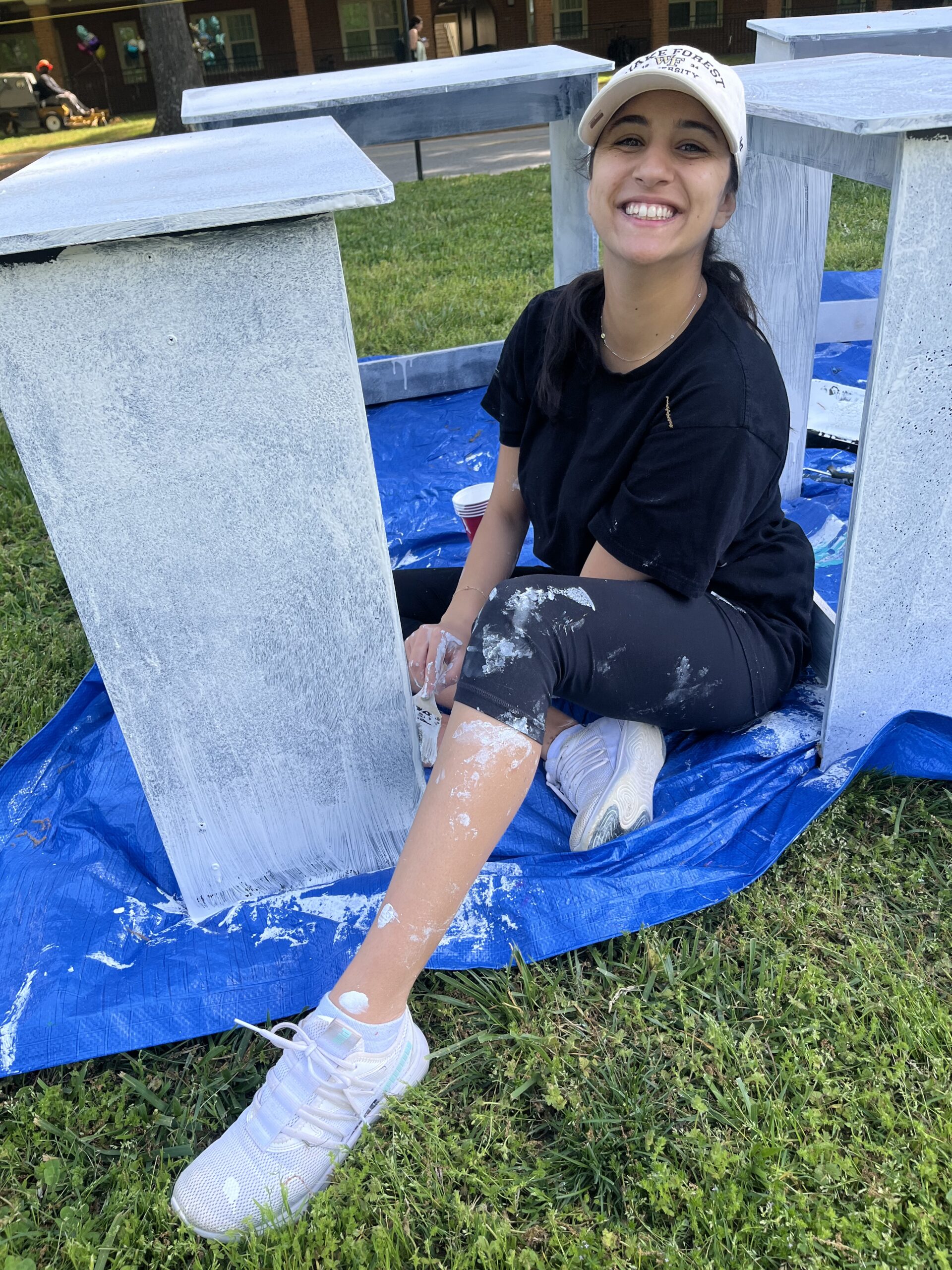
Natalya Lewitt (MSM '20), enthusiastically tackling the job
Also working with us was my lovely colleague Natalya Lewitt (MSM ’20), who so enthusiastically tackled the job that she wound up covered in primer from head to toe. I managed to wipe enough paint off my own hands to take a photo to show her, and it made us all laugh — just at the moment when I, for one, really needed it.
And we were fortunate to get to interact with the students, including Magnolia Scholar Talia Austin, a soft-spoken sophomore from Orlando, Florida, studying computer science and studio art. She came out simply to learn more about DESK while providing a helping hand and wound up working for hours.
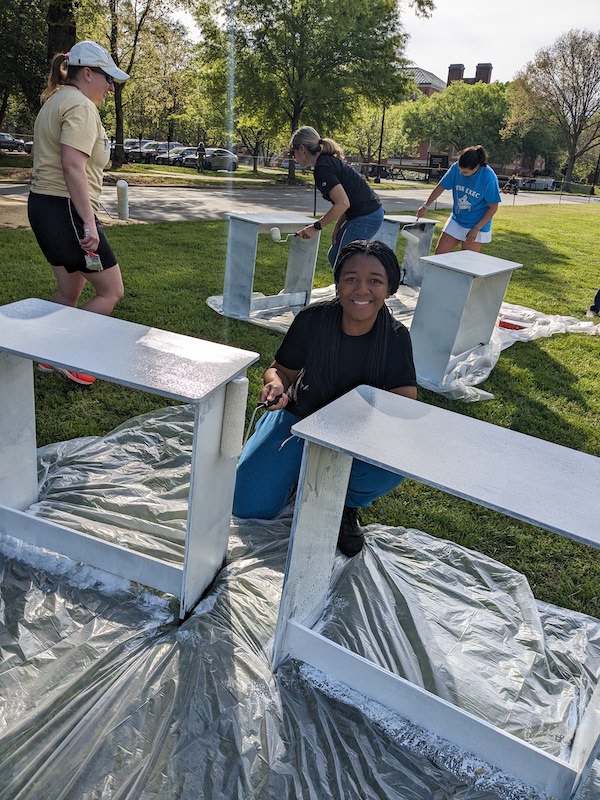
Sophomore Talia Austin and, in background middle, Kelly Greene
We were inspired by DESK’s directors, all undergraduate women, who started organizing the 200-volunteer-strong event last fall, procuring and assembling six dozen desks, recruiting volunteers and tracking down supplies — including primer and paint left over from University facilities projects that otherwise would have incurred $1,500 in disposal costs.

Creating a fun, new place to do homework<br /> Photo by Lyndsie Schlink
The elementary school students and their families arrived starting around 3 that afternoon, and I stopped by around 4:30 p.m. to take in the scene. Hundreds of Wake Forest students were painting with the children in a frenzy of pop music and a carnival-like atmosphere, complete with tents to ward off the sun and pollen.
These are the future leaders of Pro Humanitate Days, I thought. We’re in good hands.
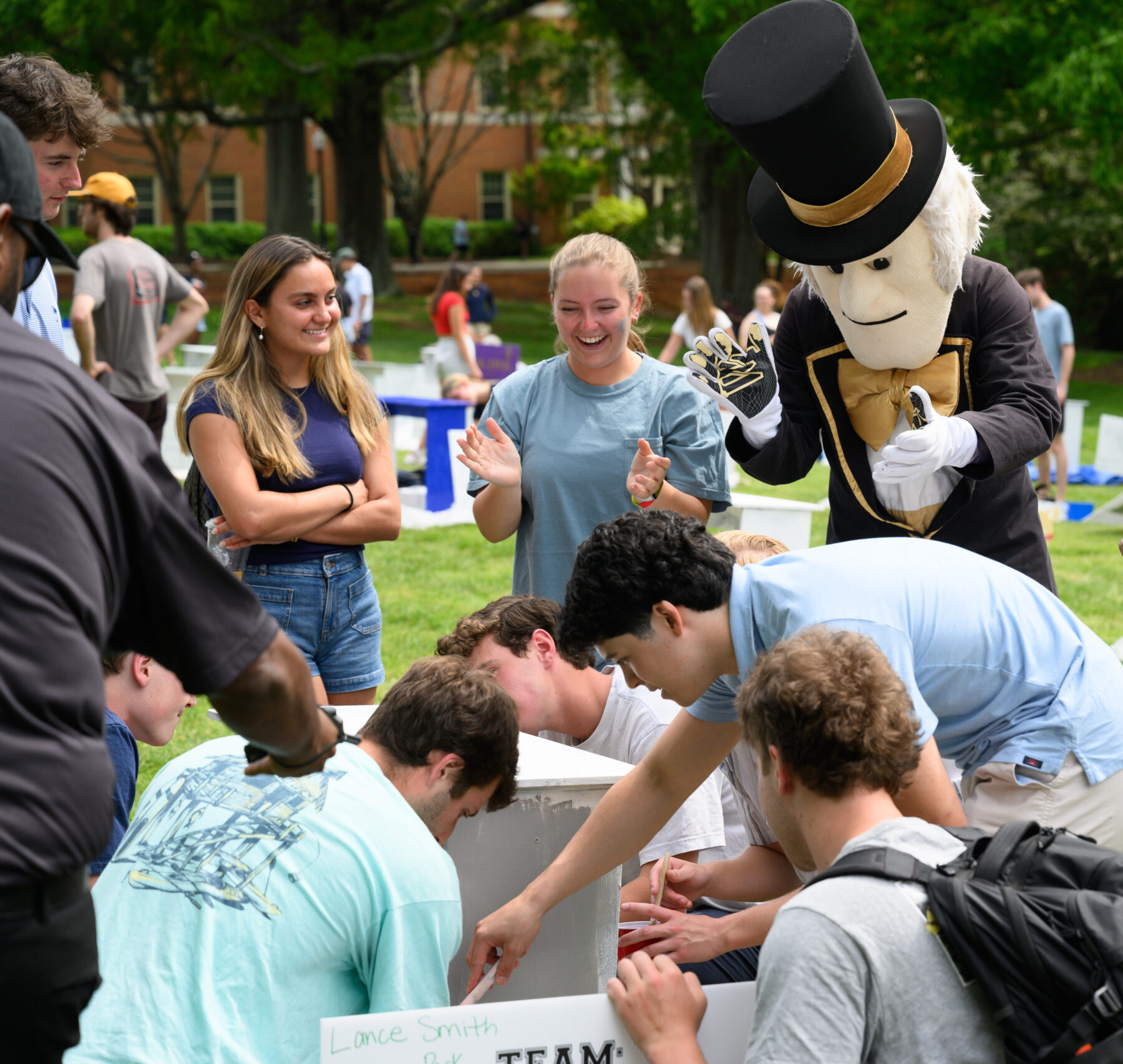
The Demon Deacon cheers on Pro Humanitate in action.<br /> Photo by Lyndsie Schlink


